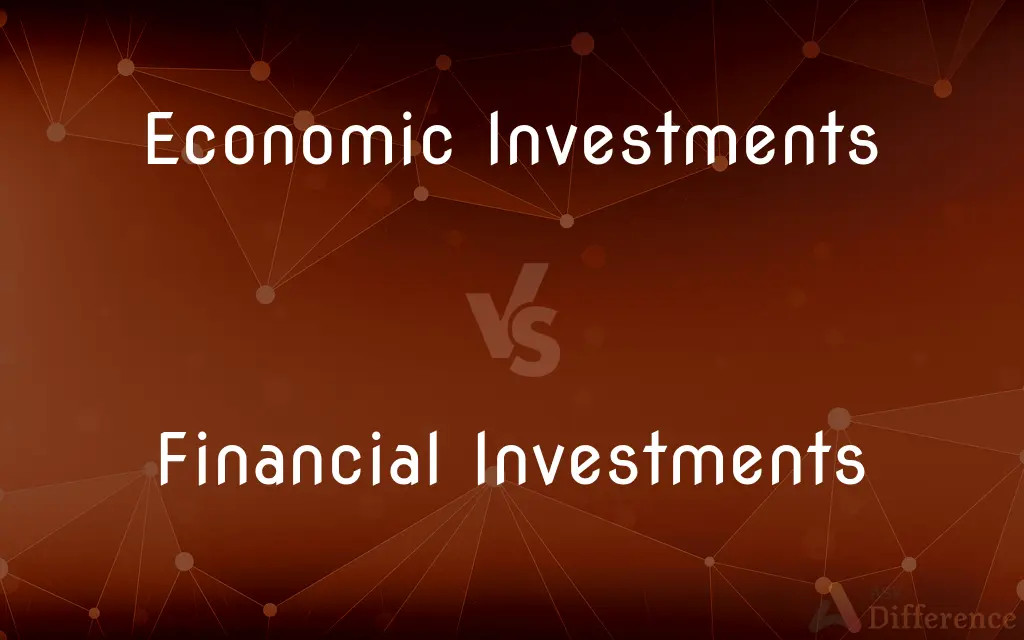Economic Investments vs. Financial Investments — What's the Difference?
By Urooj Arif & Fiza Rafique — Published on March 1, 2024
Economic investments involve allocating resources for future benefits, often in physical assets, while financial investments focus on purchasing financial assets, aiming for monetary returns.

Difference Between Economic Investments and Financial Investments
Table of Contents
ADVERTISEMENT
Key Differences
Economic investments typically refer to the purchase of physical assets or capital expenditures by businesses or governments to increase their capacity or efficiency. For instance, a company investing in new machinery to boost production is making an economic investment. These investments are driven by the goal of enhancing productivity and often involve significant amounts of capital and time before yielding benefits.
Financial investments, on the other hand, involve the allocation of funds into financial assets like stocks, bonds, or real estate, with the expectation of earning income or capital gains. An individual buying shares of a company is seeking to gain profits through dividends or an increase in share value. This form of investment is characterized by its liquidity and the potential for quicker returns compared to economic investments.
The risk profiles of economic and financial investments also differ significantly. Economic investments, due to their tangible nature and long-term orientation, often carry lower liquidity risk but higher operational risks. In contrast, financial investments can be highly liquid, allowing investors to quickly adjust their portfolios in response to market changes, albeit with potentially higher market volatility.
The decision-making process for economic versus financial investments varies greatly. Economic investments are influenced by long-term strategic considerations, such as market expansion or technological advancements, whereas financial investments are often driven by market trends, economic indicators, and individual risk tolerance.
The impact on the economy is another area of divergence. Economic investments directly contribute to productive capacity and employment, having a more immediate effect on economic growth. Financial investments, while they can provide capital to firms and governments, mainly redistribute existing assets and are more indirect in their influence on economic productivity.
ADVERTISEMENT
Comparison Chart
Nature
Allocation in physical assets or capital goods
Allocation in financial assets like stocks, bonds, real estate
Purpose
Enhance production capacity or efficiency
Earn income or capital gains
Risk Profile
Lower liquidity, higher operational risks
Higher liquidity, market volatility
Decision-making Influences
Long-term strategic considerations
Market trends, economic indicators, risk tolerance
Economic Impact
Direct contribution to productive capacity and employment
Indirect, mainly redistributing existing assets
Compare with Definitions
Economic Investments
Acquisition of physical assets to expand business operations.
A retail chain buys land for a new store.
Financial Investments
Purchasing real estate for rental income and value increase.
An individual buys a property to rent it out and sell when market prices rise.
Economic Investments
Funding educational or training programs to enhance workforce skills.
A corporation sponsors an employee skills upgrade program.
Financial Investments
Buying stocks to gain dividends and capital appreciation.
An investor purchases shares in a tech startup hoping for high returns.
Economic Investments
Investment in capital goods to increase production capacity.
A factory purchases new machinery to double its output.
Financial Investments
Investing in bonds for regular interest income.
A retiree buys government bonds for a stable income source.
Economic Investments
Investments in research and development for future technology.
A pharmaceutical company invests heavily in R&D for a new drug.
Financial Investments
Allocation of funds into mutual funds for diversified returns.
A novice investor puts money into a mutual fund for risk distribution.
Economic Investments
Spending on infrastructure projects for long-term benefits.
The government allocates funds for building a new highway.
Financial Investments
Trading in derivatives for speculative profits.
A trader uses options to speculate on the future price of gold.
Common Curiosities
How do economic investments impact the economy?
They directly enhance productive capacity and employment, contributing to economic growth.
What are financial investments?
Financial investments involve placing money into financial assets with the aim of earning income or achieving capital gains.
How do financial investments impact the economy?
Financial investments indirectly affect the economy by redistributing existing assets and providing capital to firms and governments.
What are economic investments?
Economic investments refer to the allocation of resources into physical assets or capital expenditures to boost productivity and efficiency.
What is the main goal of financial investments?
To earn income or capital gains, often with the potential for quicker returns.
Are financial investments more liquid than economic investments?
Yes, financial investments typically offer higher liquidity, allowing for quicker adjustments to investment portfolios.
How do risk profiles differ between economic and financial investments?
Economic investments carry operational risks and lower liquidity, while financial investments are subject to market volatility and higher liquidity.
What is the main goal of economic investments?
To increase production capacity or efficiency for long-term benefits.
Can economic investments be converted to financial investments?
Indirectly, as when a company's capital investments increase its stock value, benefiting financial investors.
How does the decision-making process differ between the two types of investments?
Economic investment decisions are often based on strategic needs, while financial investment decisions are influenced by market conditions and personal risk tolerance.
Why might an investor choose financial investments over economic investments?
For potential quicker returns, liquidity, and diversification benefits.
Do economic investments require a longer time horizon than financial investments?
Generally, yes, due to their focus on long-term capacity and efficiency improvements.
Can individual investors engage in economic investments?
Indirectly, through purchasing stocks in companies that undertake large capital expenditures.
What role does government policy play in economic investments?
Government policy can incentivize or disincentivize economic investments through tax breaks, subsidies, and regulations.
How do market trends affect financial investments?
Market trends can significantly influence the value and performance of financial investments.
Share Your Discovery

Previous Comparison
Seeds vs. Beans
Next Comparison
Hopefully vs. I hope soAuthor Spotlight
Written by
Urooj ArifUrooj is a skilled content writer at Ask Difference, known for her exceptional ability to simplify complex topics into engaging and informative content. With a passion for research and a flair for clear, concise writing, she consistently delivers articles that resonate with our diverse audience.
Co-written by
Fiza RafiqueFiza Rafique is a skilled content writer at AskDifference.com, where she meticulously refines and enhances written pieces. Drawing from her vast editorial expertise, Fiza ensures clarity, accuracy, and precision in every article. Passionate about language, she continually seeks to elevate the quality of content for readers worldwide.
















































